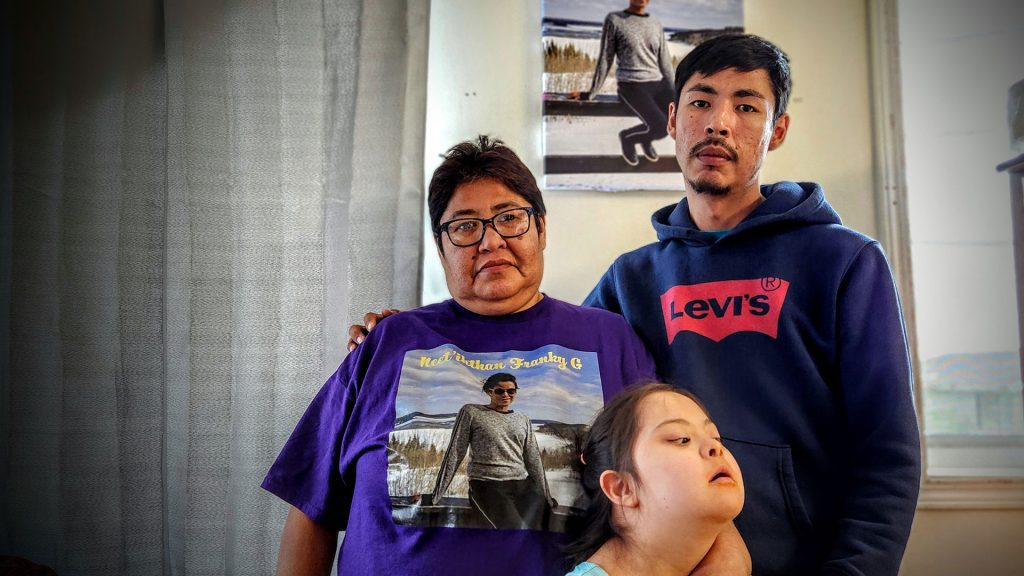
Frank Gruben’s mother Laura Kalinek (left) and siblings Kimberlyn and Steven Gruben (right) in Aklavik in June, 2023. Photo: Karli Zschogner/APTN.
This is part 4 of our series about the disappearance of Frank Gruben.
Frank Gruben, a Gwich’in and Inuvialuk man, went missing from the town of Fort Smith in the Northwest Territories on May 6, 2023.
As of the publication of this story, he has not yet been found.
Police say the investigation into Frank’s disappearance is still “active” and that investigators will look into “all information provided about the potential whereabouts of Frank Gruben or any information about the circumstances of his disappearance.”
RCMP spokesperson Cpl. Matt Halstead says “all tips about this case are logged on the investigative file and the efforts to follow up on the information are documented and reviewed by a supervisor or senior investigator.”
In the meantime, community members across the territory are keeping the search alive on social media. And Frank Gruben’s family is left waiting for answers.
Frank’s mother Laura speaks at a lantern ceremony in Aklavik in January, 2024. Video by: Karli Zschogner/APTN.
In January 2024, Frank’s family held a lantern ceremony in Aklavik, to remember him.
“I just ask you to continue to keep us in your prayers, and everybody else that’s going through hard times,” says Frank’s mother Laura Kalinek at the ceremony. “There’s so much happening now, we have to continue to pray for one another.”
Gruben’s disappearance puts spotlight on the struggles faced by students from remote communities
Frank Gruben’s friend Anne Jackson says many other students in her classes have dropped out and she herself is not sure if she should continue her education in Fort Smith.
“It’s sad to see because there was so much of us in the beginning of the school year and towards the end, there was like maybe a handful, two handfuls,” she says, “at the end of the year was heartbreaking.”
“It just seems like you’re setting them up for failure.”
Jackson suggests reassessing the more rigid expectations that may be doable down south with other demographics, and creating greater flexibility and accommodation of options for their mainly northern Indigenous student body.
“Us northern students and Arctic students going back to school, we have to get upgrading before we get into the program we want to get into and that’s normal,” says Jackson. “Know your students. It’s just, it gets me so angry because you do not want students to fail, you do not want to see such a higher dropout level.”
When asked what the college is doing to support those students who are struggling and or fall through the cracks, Aurora College spokesperson Jeff O’Keefe says the college offers tutoring, academic advising and study skills workshops, as well as check-ins for those in residence.
The college has not yet responded to questions regarding reports of Frank while in residence. Nor have they responded to inquiries about the potential existence of a policy that bans students from taking in other students that were evicted from College housing.
According to Jackson, she was verbally informed of such a policy when her request to take Frank in was declined.
In addition to Jackson and Kotokak, APTN Investigates reached out to other community members who were connected to or associated with Frank before his disappearance. None agreed to be interviewed for this story.

Across the territory, including in Yellowknife, family and friends of Frank say governments have a duty to prioritize the protection of members of the 2SLGBTQQIA community, as stated over 200 times within the National Inquiry to Missing Murdered Indigenous Women and Girls and its calls to justice.
“The whole community, surrounding communities, we suffer together,” says Grace Blake, mother of former Mackenzie Delta MLA and N.W.T. legislature speaker Frederick Blake at the unveiling of an MMIWG ceremony.
“This is not just a gender matter. We have to look beyond the scope. This young boy that we lost in a May here in the north, no word of where he is today, how sad that is for the family, for the community. We want answers,” she says.
Steven Gruben and Laura Kalinek, Frank’s brother and mother, say Frank identified as gay. They told APTN Investigates that Frank was not afraid to be who he was and despite that, Frank continued to struggle to find acceptance, and that in their rural and northern communities, lateral violence and homophobia continue to traumatize.
“He didn’t want to stick around here, that’s for sure,” says Kalinek. “There was a lot of people against him because of his sexuality. I think that’s why he wanted to leave for [Fort] Smith, because he found partners down there and a lot of caring friends who would say they’d be there for them. We didn’t know he was going through such a hard time, and like, if we knew that, we could have probably prevented it. We as parents have to stand behind them.
“In my eyes, we’re all God’s children and we should be all treated equally no matter if you’re gay, no matter the color of our skin… we have to be there for each other, look out for one another.”
Diversity in gender and sexuality “has always been there within our cultures, within our groups, within our families, and it was accepted,” says Eugene Pascal, the now former mayor of Aklavik, N.W.T., where Frank Gruben grew up.
“[Frank] had a lot of friends here. He had a lot of close acquaintances. He has a lot of family here and we feel what they’re going through.”
Pascal notes the multiple unsolved persons cases in the Gruben-Stewart family, and says there needs to be systemic and cross departmental change.
“There has to be leadership, saying, ‘What’s going on? What are you doing?’” says Pascal. “We have people here who have a lot of questions who are hurting, who have no, no idea what has happened. And they’re wondering, you know, there will always be that hanging over them.
“The onus should be right now within our systems, within the RCMP, within the justice [system] to do a more active role in getting some sort of closure.”
Gruben’s family agrees, “authorities and the people that are in those seats, it’s time to step up,” says Steven Gruben.
“Step up and let’s get something done,” his mother Laura Kalinek adds.
NWT premier provides details on upcoming missing-persons legislation

Since Frank Gruben’s disappearance, there has been a public outcry about the amount of time it’s taking the government to pass new missing-persons legislation, first promised in 2020.
New legislation could address many of the issues that have impacted the search for Frank, in part by closing the gaps in the mandates of various search-and-rescue forces operating in the N.W.T., and by empowering RCMP to gather more kinds of evidence in their investigations.
Criticism of the delays has included commentary that legislators ‘do not have to reinvent the wheel’ in missing persons legislation, as they have the rest of the country’s passed and enforced legislation to model from.
This past October, Yukon’s Missing Persons Act came into full force. Former MMIWG inquiry commissioner Qajaq Robinson says she “would also look to the Yukon for how they’ve developed and also co-developed their legislation with stakeholders, and particularly Indigenous communities and grassroots people.”
“Regardless of [Frank’s] sexual orientation, Indigenous identity, addiction, he is an individual who is missing, and it is the responsibility of the Canadian state and the police and the RCMP, and the body responsible to investigate his disappearance,” says Robinson.
R.J. Simpson was justice minister for the N.W.T. when Frank went missing. In December of 2023, he was elected Premier of the territory, and retains justice as part of his portfolio. Simpson says the legislation is almost complete.
“So, this is a bill that really gives would give the RCMP quite a bit of authority, or, and new authority to access people’s personal records, health records, communication records, and the authority to enter premises as well and search those premises,” Simpson says.
“What this legislation would do would allow the RCMP to go to the courts and ask for authority to compel evidence from people. It would also give the RCMP the ability in emergency situations, to enter premises without a court order if they believe that there’s a threat of evidence being destroyed, or documents being destroyed. It is quite a powerful piece of legislation.”
APTN asked Simpson about the current status of the legislation. He said that it will not be passed in the current legislative session, but is hopeful it will pass before the end of 2024.
“I’m disappointed as well, that it is not being passed in this government,” he says.
He says part of the delays come from spending more time weighing on balancing people’s privacy.
“Speaking to some of the other members there is a real desire that this does balance people’s privacy with the purpose of the act,” says Simpson. “I don’t have any concerns about this legislation making it into the next assembly and getting it passed.”
“There is broad support in the territory for this legislation, among the public, among legislators, among government, everyone wants to see this happen, we just want to make sure it’s done right.”
Even once missing persons legislation is passed, it could take months or years to be fully enacted. The Yukon legislation came into force six years after passing, in 2017.
Alberta’s missing persons legislation took 11 years to come into force in 2022, after passing in 2011.
The family says they were originally given an estimate by Simpson that the earliest he could see things passing was around May 2024, one year since Frank went missing.
#JusticeForFrank #BringFrankHome

Steven Gruben drives around Aklavik, their home community of 500, to get some air and try and re-ground from the absence of Frank, his best friend.
The car is special to him, it was because it’s Frank’s and his brother was proud of it, he says.
“I feel like my brother’s disappearance is also shedding light on everybody else that may have gone missing or murdered,” says Steven as he turns down a dusty side road to stop and breathe overlooking the Richardson Mountains.
“Aklavik has a motto and it’s ‘never say die,’” Gruben says. “I grew up with that motto my whole life that you just continue to stand strong on what you believe in and never give up. Don’t give up.”
Gruben wrote the petition, “Stop the Delay: NWT Missing Persons Act Needed Now.”
Inuvik’s Doris Rogers and her daughter Gabrielle McLeod are close friends with the family of Frank Gruben. In the earlier days of Frank’s disappearance, Rogers published on social media a cover of one of Laura Kalinek’s favourite songs ‘Ride Our Your Storm’, which Kalinek says plays on repeat to try and comfort and console herself in this trauma.
On Remembrance Day, Frank’s cousin and local CKLB.fm host Tanya Gruben, Uvagut TV and Inuvialuit Communication Society hosted a live recording session for musicians in the region. The daughter-sister duo used their time to dedicate and spread awareness about Frank.
Video: Karli Zschogner/APTN.
Frank’s mother Laura Kalinek tells APTN she feels for other families of missing persons.
“I pray for the families who are out there and haven’t got the answers they’re looking for,” says Kalinek.
“Keep fighting and don’t give up. There’s still lots to do for my brother,” Steven Gruben adds. “Not just for my brother, but for everybody else dealing with the same situation.
“We need justice. Frank deserves justice.”
Contact Crimestoppers to submit a tip anonymously by phone at 1-800-222-8477, or online by clicking on the “Submit a Tip” button at nwtnu.crimestoppersweb.com.
You can also call the Fort Smith RCMP detachment directly at 1-867-872-1111.
If after reading this story you’d like to talk to someone for any reason, you can call the Hope for Wellness line at 1-855-242-3310.












